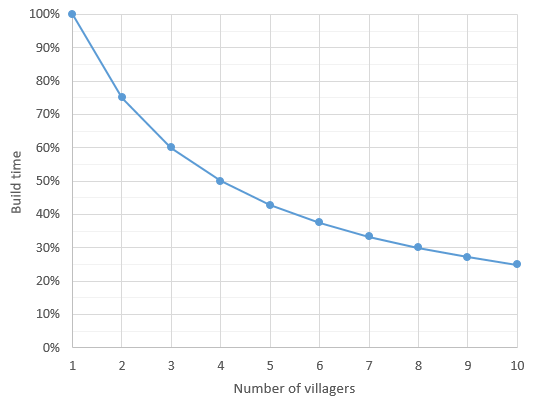2 Villagers should build double as fast as 1 villager if they build at one building at the same time.
Abut this isnt the case! The second villager will maybe add only 25% building speed to it.
I always wondered why people letting each their villager build different buildings and still be faster than me. Now I dont wonder about it anymore.
Pls fix!
There’s nothing to fix. It’s intentional. It’s the game design.
And it’s perfect the way it is.
6 Likes
They add only 33.3% speed. This needs to be fixed.
1 villager vs 4
result= 4 villager build double the speed as 1.
total waste of villager capacity. This makes no sense and needs to be fixed. Obviously if 2 people build on a house it should be twice as fast. Anyone who says different just cant think logically.
Besides it adds unnecessary micro to the game. I dont wanna send each of my villagers to a single building, i want to just give them a queue of build orders.
God this is really horrible!
It’s a trade off. On one hand you have the valuable time of your villagers. Using less builders gives you more resources collected. On the other hand you often have a pressing need to get a building up fast, whether it’s a stable you need for your scout rush, a quick-wall around your lumber camp or a forward castle you’re dropping in a contested zone. Without the reduced building efficiency the answer would pretty much always be “use as many villagers as you can” (oversimplified), but with the reduced efficiency the number of villagers to use becomes a tactical choice. And this is a game about tactical choices.
2 Likes

In the end it is some sort of trade off: If you want to rush a building, then use mulitple villagers. If you just need the building, then having 1 vill is fine.
Just to give you some examples:
-
If you build houses, then you always use 1 villager, except when you are housed (or almost housed), then you rush to build the house with multiple vills.
-
If you build a TC, then it is worth it to have it build more quickly, so you use multiple vills.
-
If you play DM, then you use each vill on a different building, so you can get up more buildings in the same time quickly.
It also kind of make sense from a logical part: Multiple workers will start getting chatting instead of working and stuff like that. So claiming it is completely illogical isnt true.
5 Likes
The formula is the following:
Regular time*3/(2+builder count)
I believe is a similar thing (made on purpose for balance reasons, not the formula) to monks healing rate, even there only the first monk heals at 100% capacity, the others, iirc, heal at 50% rate.
1 Like
This was the case in AoE I and believe me you don’t want it in AoE II, because it means if you have enough villagers you can spam the whole map with military buildings rather easily.
1 Like
irrelevant bs, but beside that, how did u know it was like that in AoE 1?
I assume they checked, somewhere over the last 24 years. 
We all ask stupid questions sometimes, and when we do we all deserve to get stupid answers.
1 Like
Come on m8 just use your brain. If build speed was multiplicative, then using more villagers to build would always be better, as sure you might have more villagers working at once, but the idle time would be exactly compensated by the faster building speed. So it would basically mean that for the same idle time spent building you could get things done insanely fast. With only 4 villagers you would be able to build a barracks in 12 seconds, a tower in 20 seconds, a town center in 25, and a castle in 50. This is of course way too fast, especially if you are not disadvantaged in idle time compared to building with one villager.
Castle and tower rushes would be more dangerous. Chances that they will fail are far more smaller.
Building build speed is based on a logarithmic math model, isn’t it?
As well as being a useful game mechanic by forcing you to choose the trade-off between building time and efficiency, having each additional worker contribute less than the first is also realistic (in general terms), as this is what happens in the real world as you add more workers to a job that could be done by one, due to the overhead of having to organise how the work is split between people.
I said “in general terms” because obviously there are jobs that cannot easily be done by one person, and building would be an example of such a job, where two people might actually be more than twice as fast as one, but as a general concept, it’s valid, and there would certainly come a point where adding more workers isn’t helpful.
I play AoE I occasionally and I actually like it more than AoE II.
